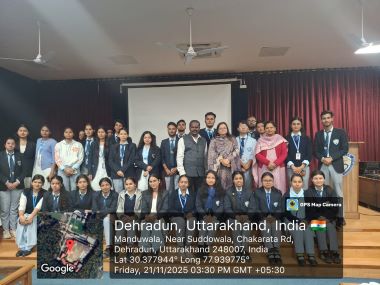21 November 2025, Dehradun
On the occasion of World Fisheries Day 2025, the ICAR–Indian Institute of Soil and Water Conservation, Dehradun, in collaboration with Dolphin PG Institute, Dehradun, organized a programme celebrating India’s expanding fisheries potential and emerging opportunities.
A special lecture highlighted the rapid growth of India’s fisheries sector and emphasized that Blue Revolution 2.0 offers ‘oceans of opportunity’ for the younger generation, particularly in terms of livelihoods, entrepreneurship, and professional advancement. The session underscored the relevance of the National Education Policy (NEP) and the capacity-building efforts of the Agriculture Skill Council of India (ASCI) in strengthening fisheries education and skills.
The lecture showcased India’s rich and diverse aquatic resources—including rivers, reservoirs, wetlands, and marine ecosystems—and their immense biodiversity. Key technological innovations transforming capture fisheries and aquaculture were discussed, along with the significant contributions of government initiatives such as the Pradhan Mantri Matsya Sampada Yojana (PMMSY) and the Fisheries and Aquaculture Infrastructure Development Fund (FIDF) in accelerating sustainable sectoral growth. It was also noted that the fisheries sector is currently growing faster than many other sectors of the Indian economy.

The progress achieved during Blue Revolution 1.0 was reviewed, detailing India’s rise in fish production from 0.7 million tonnes in 1950 to 9.6 million tonnes in 2014, and further to 19.5 million tonnes in 2025. The vision for Blue Revolution 2.0 was outlined, focusing on strengthening marine fisheries, expanding inland aquaculture, and adopting advanced technologies such as water-quality sensors, aquatic biomass monitoring tools, biofloc technology, Recirculatory Aquaculture Systems (RAS), value-addition methods, and innovations to reduce post-harvest losses.
Students and faculty participated actively in the seminar and engaged in an interactive discussion on fisheries potential and future opportunities. The programme was attended by around 50 graduate and postgraduate students, along with faculty members, who benefitted from the detailed technical insights.
(Source: ICAR–Indian Institute of Soil and Water Conservation, Dehradun)








Like on Facebook
Subscribe on Youtube
Follow on X X
Like on instagram